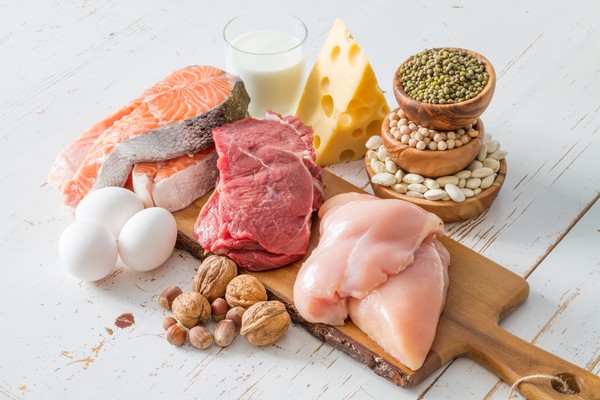

Amino Acids and Proteins: Allies for Lean Mass Gain
Today we want to talk about the relationship between amino acids, proteins, and lean mass. These are tactics for you who want to lose weight and get a healthier body.
Remember that this article is not intended to replace a visit to the doctor. In other words, the final word about your diet is in the hands of your trusted nutritionist.
Read more: Which Whey is right for you?
What is lean body mass?
Generally speaking, lean mass is all the parts of the human body that are not made up of fat. This category includes, for example, bones, muscles, organs, and body fluids.
It is easy to understand, therefore, why the concept of lean mass is often used as a synonym for muscle mass.
By the way, it is worth pointing out: muscle mass represents only a portion of lean body mass. Within this scenario fat mass still appears, meaning the potion made of fat.
When exercising in the gym, the musculature is activated, thus stimulating the development of lean mass.
Because it is considered compact, especially in relation to fat, human musculature occupies a smaller space.
See also: Whey Protein and breastfeeding: is it true that mothers can’t consume the product?
From there wrong impressions may arise, that is, having this maxim in mind, you are already able to change the perception on the subject.
It is possible that a person, following a balanced diet and doing frequent physical activity, for example, will find that his weight has stopped decreasing after a certain period of constant weight loss.
Or they may even see the scale numbers go up a bit, but this is a faithful demonstration of the definition of lean mass.
Your questions answered: How much protein do you need to consume per day?
Essential Amino Acids and Lean Mass Gain
Amino acids are the building blocks of protein.
There are 20 types of amino acids in total, 8 of which are classified as essential because they are not produced by our body.
They are: methionine, lysine, phenylalanine, threonine, tryptophan, leucine, isoleucine, and valine. Essential amino acids are necessarily obtained through diet or supplementation.
In the diet, they are found in sources such as meat, fish, and eggs. However, they are in varying concentrations, which may not reach the optimal concentrations that our body needs.
Essential amino acid supplements are designed to have all the amino acids in a balanced form, so that they are converted into protein more efficiently.
In addition, essential amino acid supplements do not need to be broken down during the digestion process to be absorbed, and can reach the bloodstream in about 20 minutes.
Their efficient conversion into protein can bring benefits for immunity, skin appearance, hair and nails, joints, difficulty in protein production due to poor diet, endocrine system, among other processes that depend on protein.

Train between 3 and 6 times a week
To gain muscle mass faster, it is important to maintain an adequate frequency of workouts, which should be done based on your fitness level. Check it out:
- Beginners: should train 2 to 3 times a week;
- Intermediates: 4 to 6 times a week
- Advanced: 4 to 6 times a week.
Consume more protein
Increasing protein intake is necessary to allow muscle growth, and it is important that the food sources of protein are well distributed throughout the day, and not concentrated in only 2 or 3 meals.
These foods are mainly of animal origin, such as meat, fish, chicken, cheese, eggs, and milk and dairy products, but protein can also be found in good quantities in foods such as beans, peas, lentils, peanuts, and chickpeas.
In addition, sometimes it may be necessary to use protein-based supplements, such as Whey Protein and casein, especially used post-workout or to increase the nutritional value of protein-poor meals throughout the day.
Now you know how to increase your lean mass and lose weight.
Did you like the content? Keep following our Blog.
We are always bringing you tips, news, and updates on nutrition that generates results.
Amino Acids and Proteins: Allies for Lean Mass Gain
Today we want to talk about the relationship between amino acids, proteins, and lean mass. These are tactics for you who want to lose weight and get a healthier body.
Remember that this article is not intended to replace a visit to the doctor. In other words, the final word about your diet is in the hands of your trusted nutritionist.
Read more: Which Whey is right for you?
What is lean body mass?
Generally speaking, lean mass is all the parts of the human body that are not made up of fat. This category includes, for example, bones, muscles, organs, and body fluids.
It is easy to understand, therefore, why the concept of lean mass is often used as a synonym for muscle mass.
By the way, it is worth pointing out: muscle mass represents only a portion of lean body mass. Within this scenario fat mass still appears, meaning the potion made of fat.
When exercising in the gym, the musculature is activated, thus stimulating the development of lean mass.
Because it is considered compact, especially in relation to fat, human musculature occupies a smaller space.
See also: Whey Protein and breastfeeding: is it true that mothers can’t consume the product?
From there wrong impressions may arise, that is, having this maxim in mind, you are already able to change the perception on the subject.
It is possible that a person, following a balanced diet and doing frequent physical activity, for example, will find that his weight has stopped decreasing after a certain period of constant weight loss.
Or they may even see the scale numbers go up a bit, but this is a faithful demonstration of the definition of lean mass.
Your questions answered: How much protein do you need to consume per day?
Essential Amino Acids and Lean Mass Gain
Amino acids are the building blocks of protein.
There are 20 types of amino acids in total, 8 of which are classified as essential because they are not produced by our body.
They are: methionine, lysine, phenylalanine, threonine, tryptophan, leucine, isoleucine, and valine. Essential amino acids are necessarily obtained through diet or supplementation.
In the diet, they are found in sources such as meat, fish, and eggs. However, they are in varying concentrations, which may not reach the optimal concentrations that our body needs.
Essential amino acid supplements are designed to have all the amino acids in a balanced form, so that they are converted into protein more efficiently.
In addition, essential amino acid supplements do not need to be broken down during the digestion process to be absorbed, and can reach the bloodstream in about 20 minutes.
Their efficient conversion into protein can bring benefits for immunity, skin appearance, hair and nails, joints, difficulty in protein production due to poor diet, endocrine system, among other processes that depend on protein.
Train between 3 and 6 times a week
To gain muscle mass faster, it is important to maintain an adequate frequency of workouts, which should be done based on your fitness level. Check it out:
- Beginners: should train 2 to 3 times a week;
- Intermediates: 4 to 6 times a week
- Advanced: 4 to 6 times a week.
Consume more protein
Increasing protein intake is necessary to allow muscle growth, and it is important that the food sources of protein are well distributed throughout the day, and not concentrated in only 2 or 3 meals.
These foods are mainly of animal origin, such as meat, fish, chicken, cheese, eggs, and milk and dairy products, but protein can also be found in good quantities in foods such as beans, peas, lentils, peanuts, and chickpeas.
In addition, sometimes it may be necessary to use protein-based supplements, such as Whey Protein and casein, especially used post-workout or to increase the nutritional value of protein-poor meals throughout the day.
Now you know how to increase your lean mass and lose weight.
Did you like the content? Keep following our Blog.
We are always bringing you tips, news, and updates on nutrition that generates results.
Thank you for reading and see you next time!
Thank you for reading and see you next time!